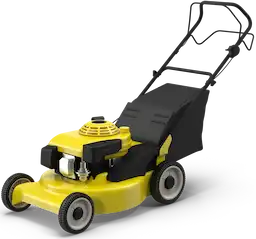To control armyworms in your lawn naturally, begin by applying a soap and water mixture to irritate the caterpillars. Encourage natural predators like birds and beneficial insects, which can help manage the population. Homemade sprays made from garlic, hot pepper, or neem oil serve as effective deterrents. Moreover, introduce beneficial insects like parasitic wasps and use diatomaceous earth for added protection. Regular lawn maintenance, such as mowing and aeration, promotes grass health and reduces vulnerability to infestations. Maintaining a healthy lawn is key, and further insights will enhance your strategies for a thriving environment.
What Are Armyworms and Why Are They a Problem?
Armyworms are the larvae of various moth species that pose a significant threat to lawns by voraciously feeding on grass, particularly during late summer and early fall.
Identifying these pests, which measure 1.5 to 2 inches long and display distinct stripes, is essential for early intervention.
Signs of armyworm damage include irregular patches of brown grass that can develop rapidly, emphasizing the need for vigilant monitoring and prompt action.
Identifying Armyworms
The larvae of common moth species, known as armyworms, pose a significant threat to lawns due to their voracious appetite for grass.
Typically measuring 1.5 to 2 inches in length, armyworm larvae can be identified by the distinct inverted Y-shaped mark on their heads. These caterpillars primarily feed at night, making it challenging to spot them during the day, particularly in late summer to early fall when they are most active.
Their feeding habits can result in irregular brown patches and ragged blade edges in your lawn. Rapid infestations can occur within days, emphasizing the importance of regular monitoring to identify armyworms early.
Maintaining a healthy lawn is crucial in preventing these pests and mitigating potential damage.
Signs of Armyworm Damage
Although often overlooked until significant damage occurs, the signs of armyworm infestation can be quite evident in a lawn.
Armyworm damage typically manifests as irregular patches of brown grass, often with ragged or chewed-up grass blades. These small brown spots can rapidly expand, leading to larger areas of complete browning if not addressed promptly.
The most pronounced damage usually occurs during late summer and early fall when armyworms are most active. Furthermore, the presence of these caterpillars, which can grow up to 2 inches in length, further signifies an infestation.
Early detection is essential, as recovery from extensive armyworm damage becomes increasingly challenging once the caterpillars mature and cause significant harm to your lawn.
Natural Ways to Treat Armyworms in Your Lawn
Natural treatments for armyworms in your lawn can be highly effective and environmentally friendly.
Utilizing a soap and water mixture can help eliminate these pests, while attracting natural predators encourages a balanced ecosystem.
Furthermore, homemade sprays can provide a direct deterrent against armyworms, ensuring your lawn remains healthy and vibrant.
Use a Soap and Water Mixture
Combatting armyworms in your lawn can be effectively achieved with a simple soap and water mixture. This solution, typically made by mixing 2 tablespoons of dish soap in 1 gallon of water, serves to irritate the caterpillars’ skin, prompting them to surface.
When applied in the early morning or late afternoon, when armyworms are most active, the soap mixture effectively draws them out for easier identification and removal.
Regular inspections of the lawn for signs of infestation, such as brown patches or visible caterpillars, allow homeowners to apply this mixture promptly.
Importantly, this natural method is harmless to beneficial insects, making it a sustainable choice for integrated pest management in your lawn care routine.
Attract Natural Predators
In addition to using a soap and water mixture to manage armyworms, attracting natural predators can greatly enhance your lawn’s defense against these pests.
Encouraging birds feeding on caterpillars is an effective strategy, as many bird species naturally control armyworm populations. To foster a diverse ecosystem, maintain a variety of flowering plants that attract beneficial insects, such as wasps and ladybugs, which prey on armyworm larvae.
Creating habitats like brush piles or native plant areas provides shelter for these predators, increasing their presence in your lawn. Furthermore, consistently providing water sources, such as bird baths, can help attract birds, promoting their activity and ensuring a robust natural pest control system.
Avoiding broad-spectrum insecticides will further support these beneficial organisms.
Homemade Sprays for Armyworms
A variety of homemade sprays can effectively tackle armyworm infestations in your lawn while minimizing chemical use.
One effective option is a soap and water mixture, combining 2 tablespoons of dish soap with 1 gallon of water, which helps draw out armyworms for easy removal.
Furthermore, a garlic and hot pepper spray serves as a potent natural insect repellent, deterring armyworms when applied directly to affected areas.
Neem oil, derived from the neem tree, acts as a natural insecticide, disrupting armyworm feeding and reproduction.
Finally, essential oil sprays using peppermint or rosemary can repel armyworms due to their strong scent.
Incorporating these homemade sprays can support a healthier lawn ecosystem while effectively managing armyworm populations.
Preventing Armyworm Infestations
Preventing armyworm infestations begins with effective lawn maintenance practices that promote healthy grass growth.
Regularly mowing, watering, and aerating your lawn can greatly reduce the risk of attracting these pests. Discover essential lawn maintenance tips to prevent pests.
Moreover, incorporating organic lawn care tips, such as removing debris and encouraging natural predators, can further enhance your lawn’s resilience against armyworms.
Lawn Maintenance Best Practices
Effective lawn maintenance is essential for preventing armyworm infestations and ensuring a healthy outdoor space.
To discourage armyworms in your lawn, maintain grass height between 2 to 3 inches through consistent mowing, which minimizes egg-laying sites. Regular monitoring for early signs, such as small brown patches and increased bird activity, enables prompt intervention.
Implementing a proper lawn care routine, including adequate watering and aeration, promotes robust grass growth, making it less vulnerable to damage.
Furthermore, keep your yard weed-free to eliminate potential attractants for armyworm moths. Encouraging natural predators like birds and beneficial insects can further aid in controlling armyworm populations, creating a balanced ecosystem that supports a thriving lawn.
Organic Lawn Care Tips
While maintaining a healthy lawn is essential for aesthetic appeal, it is equally important in preventing armyworm infestations. Implementing a robust organic lawn care routine is key to deterring armyworm larvae.
Regularly monitor your lawn for early signs of infestations, such as increased bird activity or transparent grass blade tips. Mow your grass to an appropriate height, as shorter blades can discourage adult moths from laying eggs.
Furthermore, aerate and water your lawn properly to promote robust grass growth, making it less susceptible to damage. Keeping your yard weed-free enhances visibility and reduces habitats for moths.
Finally, encourage natural predators like birds and beneficial insects by providing habitats, fostering a balanced ecosystem that naturally controls armyworm populations.
Restoring Your Lawn After Armyworm Damage
Restoring your lawn after armyworm damage requires a strategic approach to encourage healthy regrowth.
Essential steps include maintaining proper hydration, applying balanced fertilizers, and overseeding if necessary.
In cases of extensive damage or persistent issues, seeking professional assistance may be beneficial to guarantee effective recovery.
Steps to Help Grass Recover
To guarantee your lawn recovers from armyworm damage, it is essential to implement a series of focused steps that promote regrowth and strengthen the grass.
Begin by ensuring consistent moisture in the soil, as this is vital for quick recovery. Apply a balanced fertilizer to the affected areas to encourage new growth and fortify the grass.
In regions with northern grasses, overseed your lawn to restore thickness and achieve a lush appearance.
Regular lawn maintenance practices, such as mowing and aeration, should be incorporated to support the recovery process and prevent future infestations.
When to Seek Professional Help
When significant armyworm damage occurs, seeking professional help becomes vital, especially if large areas of your lawn exhibit complete browning or severe stress.
Professionals can accurately assess the extent of armyworm damage and recommend effective strategies for recovery, such as reseeding and soil amendments.
Timely intervention is imperative, as experts can prevent the spread of armyworms to neighboring lawns while addressing underlying issues that may have contributed to the infestation.
If your lawn shows no signs of recovery despite following basic care practices, consulting professionals for specialized treatments is advisable.
They can implement integrated pest management practices to guarantee long-term lawn health and resilience against future infestations, facilitating a successful restoration process.
FAQs About Natural Armyworm Treatments
How to Get Rid of Army Worms in Lawn Naturally?
To effectively address armyworm infestations in your lawn naturally, implement regular maintenance practices, encourage beneficial predators, and consider natural insecticides. Furthermore, promoting lawn health through proper watering and fertilization can enhance resistance to future infestations.
How Do You Control Armyworms Naturally?
To control armyworms naturally, implement regular lawn maintenance, encourage beneficial nematodes, and utilize natural insecticides. Furthermore, fostering a balanced ecosystem with natural predators further aids in managing armyworm populations effectively and sustainably.
What Is a Homemade Spray for Armyworms?
A homemade spray for armyworms can be created by mixing 1 tablespoon of dish soap with 1 gallon of water. This solution helps draw larvae to the surface, facilitating their removal by natural predators.
What Causes Army Worms in the Lawn?
Armyworms are primarily attracted to well-fertilized lawns with lush grass. Conditions such as over-fertilization, excessive watering, and warm, dry weather can create favorable environments for their rapid growth and subsequent infestations. Regular monitoring is essential.





